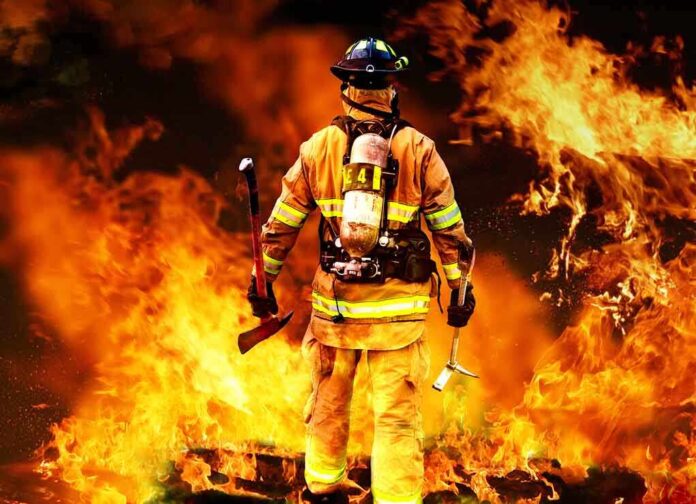Federal immigration enforcement during a raging wildfire strips essential personnel from the front lines, igniting a firestorm over public safety and government priorities.
Story Snapshot
- Border Patrol arrested two firefighters battling Washington’s Bear Gulch Fire for alleged immigration violations, removing them during active suppression.
- Federal agencies terminated contracts with two private firefighting companies, escorting dozens more workers off federal land.
- Officials and communities decry the disruption of emergency response amid hazardous wildfire conditions and question government priorities.
- The incident marks an unprecedented collision of immigration enforcement and disaster response, fueling debate over federal overreach and public safety.
Federal Enforcement Actions Disrupt Wildfire Response
On August 27, 2025, U.S. Border Patrol agents arrested two firefighters employed by private contractors while they were actively working to contain the Bear Gulch Fire in Olympic National Forest, Washington. The arrests followed an employment verification process that reportedly flagged alleged immigration violations. This move, targeting essential personnel during a crisis, drew swift condemnation from state officials, local communities, and wildfire response leaders, who cited risks to public safety and questioned the timing and judgment of federal agencies.
Federal agencies, including the Bureau of Land Management, responded by terminating contracts with ASI Arden Solutions and Table Rock Forestry Inc., the two companies employing the detained firefighters. In addition to the arrests, 42 other contractor employees were escorted off federal lands. Authorities asserted that fire suppression was not disrupted, but some on-site accounts disputed this, emphasizing the sudden personnel loss during a critical phase of containment efforts. The move comes as the Bear Gulch Fire, the largest in the region since 1951, continues to threaten communities and degrade air quality.
Political Leaders and Communities React to Enforcement Amid Crisis
Washington Governor Bob Ferguson and U.S. Senator Patty Murray swiftly condemned the arrests, demanding transparency and policy clarification from federal agencies. Local communities, already strained by evacuations and hazardous air, expressed alarm over the removal of frontline responders. The incident management team overseeing the fire acknowledged the arrests but maintained that containment work continued, though with a reduced workforce. The tension between federal priorities and local emergency needs has reignited debate over immigration enforcement during disasters, with many viewing the timing and approach as government overreach that endangered public safety.
The Olympic Peninsula relies on contracted crews, including both U.S. citizens and migrant labor, to battle wildfires. This intervention marks the first known instance of federal immigration enforcement directly disrupting wildfire suppression in the region. The decision to remove essential personnel while hazardous conditions persisted fueled political scrutiny and public frustration, especially as local residents remained vulnerable to fire and smoke. The episode has amplified concerns about the chilling effect on future recruitment of necessary seasonal labor and the broader implications for emergency response capacity nationwide.
Broader Implications: Policy, Labor, and Constitutional Concerns
The Bear Gulch Fire incident highlights the complex intersection of immigration policy, labor needs, and emergency management. Industry experts warn that aggressive enforcement actions threaten to undermine disaster response by discouraging both citizens and legal migrant workers from participating in high-risk, essential roles. Contractors now face increased scrutiny and uncertainty, while communities endure heightened anxiety as fires continue to burn with fewer hands available on the front lines. The event also raises questions about the scope of federal authority and the potential for government actions to erode constitutional protections and local autonomy during emergencies.
Two firefighters battling Washington state’s biggest wildfire arrested by Border Patrol agentshttps://t.co/Y7tdkk2RJE
— MSN Canada (@MSNca) August 29, 2025
As the fire burned nearly 9,000 acres with containment at only 13%, the debate intensified over the balance between enforcing the law and safeguarding public welfare. The controversy underscores growing concerns among conservatives and community leaders: that unchecked federal action, especially in the name of border security, can jeopardize core values—public safety, individual liberty, and limited government—when applied without common sense or regard for urgent local needs. Policymakers and citizens alike are now watching for clearer guidelines to ensure that future enforcement does not repeat these costly failures in judgment.
Sources:
Bear Gulch Fire overview and timeline
On-the-ground reporting, air quality, community impact, and arrest details
Arrests, agency statements, and political response
Arrest details and federal agency statements
Contractor and enforcement details, federal agency statements











